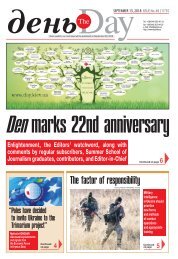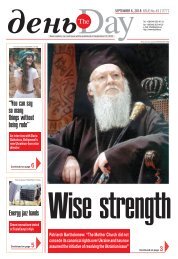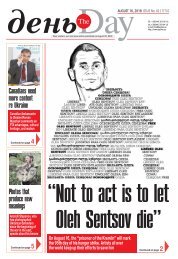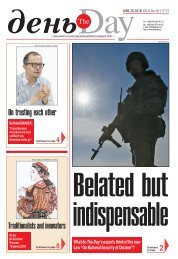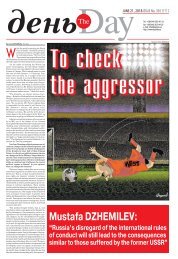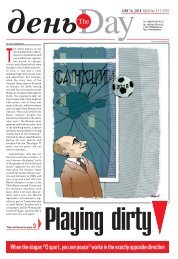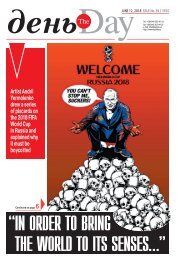#40_1-8
Create successful ePaper yourself
Turn your PDF publications into a flip-book with our unique Google optimized e-Paper software.
WWW.DAY.KIEV.UA<br />
DAY AFTER DAY No.40 JUNE 26, 2018 3<br />
By Natalia PUSHKARUK, The Day<br />
Recently, President of<br />
Ukraine Petro Poroshenko<br />
made two new appointments<br />
to the Ukrainian<br />
diplomatic service: he<br />
approved the appointment of retired<br />
Ukrainian army commander<br />
Lieutenant-General Petro Lytvyn<br />
as our ambassador to Armenia,<br />
and that of Ihor Tumasov as ambassador<br />
to the Republic of Peru. The<br />
decrees have been made public on<br />
the website of the Presidential<br />
Administration.<br />
The decision to appoint Lytvyn<br />
caused a wave of dissatisfaction.<br />
After all, the official biography<br />
of Lytvyn makes clear that he graduated<br />
from Kyiv Armor Engineering<br />
Academy, the National Defense<br />
Academy of Ukraine and<br />
served in various officer postings.<br />
However, it lists no experience in<br />
the diplomatic service. In addition,<br />
there have been numerous<br />
damaging media reports, most recently<br />
repeated by MP Yurii<br />
Bereza, who said in the chamber on<br />
June 20: “This is the Lytvyn who<br />
abandoned his soldiers in the Sector<br />
D in eastern Ukraine. This is the<br />
Lytvyn whose actions might have<br />
cost me and my brothers-in-arms<br />
our lives.”<br />
It is worth recalling that the<br />
Lytvyn family is quite prominent in<br />
Ukrainian politics. Petro Lytvyn’s<br />
brothers Volodymyr and Mykola also<br />
held high positions. Volodymyr<br />
Lytvyn was speaker of the Verkhovna<br />
Rada and chief of the Presidential<br />
Administration, while General<br />
of the Army of Ukraine Mykola<br />
Lytvyn served as chairman of the<br />
State Border Guard Service. “I<br />
want to remind you that we have a<br />
‘heroic’ little family here, with<br />
one of its members sitting here in<br />
the chamber, who welcomed the<br />
Kharkiv Agreements and has attacked<br />
the Ukrainian state and<br />
Ukrainians every time he has spoken...<br />
And another hero is the newly<br />
appointed ambassador of<br />
Ukraine to Armenia,” Bereza noted<br />
in his speech as well.<br />
“Mr. President, look into the<br />
eyes of the mothers of those who<br />
have not returned from this war..,”<br />
the MP continued. “Lytvyn’s appointment<br />
confirms the thesis that<br />
there is corruption in this chamber...<br />
Unfortunately, the aggressor<br />
state spends a lot of money to ensure<br />
that such people as Lytvyn retain<br />
influence on the government<br />
policy of Ukraine. I would like to<br />
appeal once again to Foreign Minister<br />
Pavlo Klimkin. Friends, you<br />
have crossed the line... I know that<br />
such a person would not have been<br />
allowed to become ambassador in<br />
any other country. Shame on you.”<br />
Chairperson of the Verkhovna<br />
Rada Committee on Foreign Affairs<br />
Hanna Hopko has criticized<br />
the president’s decision as well.<br />
She reminded those present that<br />
her committee had been advocating<br />
the norm requiring candidates for<br />
ambassadorial positions to undergo<br />
preliminary consultations, so as<br />
to allow the committee to “sift out<br />
unprofessional people who bring<br />
dishonor to Ukraine.” “Instead,<br />
we have seen Poroshenko appointing<br />
his own associates. Are we really<br />
so short of people? Is the<br />
Ukrainian diplomatic service totally<br />
lacking people who can represent<br />
Ukraine with dignity? We<br />
saw other personnel appointments<br />
before. I now understand why<br />
Poroshenko has vetoed the Law of<br />
Ukraine ‘On the Diplomatic Service,’<br />
which we approved here on<br />
April 5 with 276 votes in favor. He<br />
did not like consultations in the relevant<br />
committee. And this is not<br />
about specific people serving on the<br />
committee. This is about institutions,<br />
about the principle which<br />
“Are we really so<br />
short of people?”<br />
people fought for after the Maidan,<br />
I mean ensuring that the institutions<br />
defend human rights regardless<br />
of who occupies what position,”<br />
she said.<br />
How are experts commenting on<br />
this appointment?<br />
● “WE SEE A WEAK<br />
CANDIDATE AND A WEAK<br />
POLITICAL DECISION<br />
WHICH REFLECTS A<br />
SYSTEMIC PROBLEM”<br />
Bohdan YAREMENKO, chairman of the<br />
board at the Maidan of Foreign Affairs<br />
Foundation:<br />
“Appointment of Petro Lytvyn<br />
as ambassador of Ukraine to Armenia<br />
illustrates a systemic problem<br />
plaguing foreign policy governance<br />
in Ukraine. In accordance<br />
with the Constitution, the president<br />
of Ukraine, unusually for<br />
mixed parliamentary-presidential<br />
systems, has been given executive<br />
powers: he not only represents<br />
Ukraine in international relations,<br />
but effectively manages all foreign<br />
policy activities, and also very<br />
carefully protects his right to stay<br />
uncontrolled.<br />
“Recently, the parliament attempted,<br />
with the law ‘On the<br />
quainted with a matter, while consultations<br />
are a form of approval,<br />
and hence a form of control. We,<br />
meanwhile, do not have public and<br />
parliamentary control over foreign<br />
policy activities. Therefore,<br />
the president, guided by the belief<br />
that he is constitutionally empowered<br />
to do so, makes decisions at his<br />
own discretion.<br />
“In this case, this decision is<br />
subject to criticism in every regard.<br />
Firstly, the candidate itself<br />
looks suspicious. Why is a soldier<br />
getting appointed, and not a<br />
diplomat, who knows the Armenian<br />
language or understands the<br />
intricacies of the diplomatic service?<br />
Is not there a better candidate?<br />
Moreover, that soldier has,<br />
unfortunately, a very problematic<br />
reputation, which is associated<br />
with the Ilovaisk tragedy. In addition,<br />
he is a brother of<br />
Volodymyr Lytvyn. Obviously,<br />
this appointment is based precisely<br />
on such connections and<br />
nepotism. He has no professional<br />
qualities, knowledge, skills needed<br />
to serve as an ambassador, especially<br />
in such a complex country<br />
with which we have a lot of fundamental<br />
disagreements. I do not<br />
understand why his candidacy is<br />
Diplomatic Service,’ to enact provisions<br />
requiring consultations in<br />
the parliamentary committee when<br />
appointing ambassadors, but the<br />
president has vetoed it. However,<br />
he made a counter-proposal to present<br />
candidates for ambassadorial<br />
positions to the committee, but<br />
presentation and consultations are<br />
different things, since presentation<br />
is just a way to get people acany<br />
better than the candidacy of<br />
any department head in the Ministry<br />
of Foreign Affairs.<br />
“Secondly, why is our ambassador<br />
getting appointed to Armenia<br />
at all? After all, that country,<br />
which is an ally of Russia, officially<br />
voted against the UN resolution<br />
that supported the territorial<br />
integrity of Ukraine, and<br />
therefore, Armenia does not rec-<br />
Hanna Hopko, other politicians and experts have sharply criticized the<br />
appointment of career soldier Petro Lytvyn as ambassador to Armenia<br />
Photo by Ruslan KANIUKA, The Day<br />
ognize the territorial integrity of<br />
our state. Thus, the absence of a<br />
Ukrainian ambassador there can<br />
be considered a way of expressing<br />
disagreement with its position.<br />
This is a weak demarche, but a demarche<br />
nevertheless.<br />
“That is, we see a weak candidate<br />
and a weak political decision<br />
that cannot be explained, because<br />
we are completely in the dark about<br />
personnel selection with its defining<br />
principles and criteria, since it<br />
happens behind closed doors and<br />
shuttered windows in the Presidential<br />
Administration.<br />
“All this testifies to the fact<br />
that the diplomatic service is in a<br />
state of decay, and it is probably<br />
already as bad as it gets. The foreign<br />
policy service has turned into<br />
a PR department for the president.<br />
And this is not only about<br />
Poroshenko, such a situation took<br />
shape quite a long time ago, and it<br />
was like this, in fact, with all the<br />
presidents. The president has the<br />
right to appoint ambassadors at<br />
his own discretion, but whether<br />
this is reasonable and what criteria<br />
are used in exercising this<br />
right, we do not know. And this is<br />
a big problem.”<br />
● “GIVEN THE BAD PUBLICITY,<br />
THE PRESIDENT WOULD DO<br />
WELL TO EXPLAIN TO THE<br />
PUBLIC WHAT THE<br />
DECISION WAS BASED ON”<br />
Vasyl FILIPCHUK, chairman of the<br />
board at the International Center for<br />
Policy Studies:<br />
“There are two major ways of appointing<br />
ambassadors around the<br />
world. For example, in the US, these<br />
are mostly purely political appointments,<br />
while in European countries,<br />
ambassadors are appointed from<br />
among career diplomats. In Ukraine,<br />
as a rule, ambassadors are appointed<br />
from among high-level career<br />
diplomats who have worked for a certain<br />
time in the diplomatic service<br />
and meet the requirements for an<br />
ambassadorial posting. Still, a certain<br />
part of the appointments is political<br />
by nature: people who have a<br />
certain political weight get appointed<br />
to such positions.<br />
“It is unclear what was the logic<br />
behind the appointment of this<br />
person as ambassador to Armenia.<br />
On the one hand, he is definitely not<br />
a career diplomat who has gone<br />
down the diplomatic service path and<br />
can occupy this post. On the other<br />
hand, he is not a politician either.<br />
This is the result of some personal<br />
decisions on the part of the president.<br />
Considering the problematic<br />
qualities of this person, he probably<br />
had some compelling reasons to<br />
make this appointment.<br />
“Indeed, Armenia is not a G7<br />
country and not one of Ukraine’s<br />
Top 5 priorities. Still, it is an important<br />
country for us: we have a<br />
large Armenian community, there<br />
are certain interests, we have a<br />
partnership with Azerbaijan, and<br />
Azerbaijani-Armenian relations<br />
are very complicated. Therefore, a<br />
highly skilled diplomat should be<br />
appointed to this post. Requirements<br />
are very high there. Everyone<br />
in the diplomatic service remembers<br />
former Ambassador Oleksandr<br />
Bozhko, who served in Armenia<br />
for a long time and worked to<br />
maintain good relations between<br />
our two countries.<br />
“Given the bad publicity, the<br />
president would do well to explain to<br />
the public what the decision was<br />
based on. This is not a personal patronage<br />
service for the head of state<br />
or a position at his factory. These are<br />
government positions that require<br />
nation-level thinking and statesman-like<br />
responsibility. It is doubtful<br />
whether the criteria of statesman-like<br />
responsibility were in fact<br />
met with this appointment.<br />
“The question is important and<br />
significant in public opinion, therefore<br />
the president should explain to<br />
the public why he has made such an<br />
appointment, and what determined<br />
his decision.<br />
“Another aspect is that this decision<br />
calls into question the credibility<br />
of the diplomatic service. We<br />
have a lot of good, high-quality career<br />
diplomats. The ambassadorial<br />
position is not a sinecure. However,<br />
the impression is that it is precisely<br />
that: if you are a good friend of the<br />
president, but he cannot get you a position<br />
here, then you can go serve as<br />
an ambassador for a good salary,<br />
plus you get to use an ambassadorial<br />
residence, a car, a chauffeur, and<br />
so on. The impression is that decisions<br />
are made sometimes to satisfy<br />
one’s friends’ avarice. I really do not<br />
want this to be true.”





